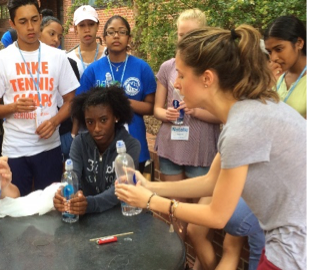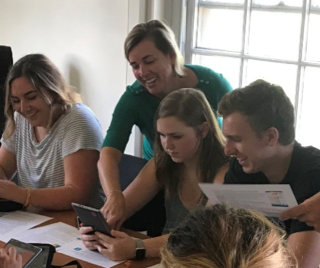IE, NC Museum of Natural Sciences receive National Science Foundation funding to engage youth in learning about climate resilience
November 3, 2019
Responding to the challenge of developing resilient communities as the world faces more frequent and severe extreme weather events, Kathleen Gray and Dana Haine of the UNC Institute for the Environment’s Center for Public Engagement with Science were recently awarded a $350,000 grant from the National Science Foundation’s Advancing Informal STEM Learning (AISL) program. In a two-year pilot study, titled Youth Engaging in the Science of Resilience in Urban and Rural NC (YES-Resilience), the Center will partner with the North Carolina Museum of Natural Sciences (NCMNS) to develop an environmental health-focused climate resilience curriculum and implement it during a year-long science enrichment program for high school students at the museum’s Raleigh and Whiteville locations.
Thirty-two students in grades 10 through 12 will be selected for this program in the spring of 2020. Half of the participants will be chosen from the Triangle, while the other half will be from the Whiteville area, creating a diverse cohort of students from urban and rural backgrounds. In June 2020, these students will participate in a six-day institute at each location and in a variety of collaborative activities and field trips that will occur during the subsequent school year. Participants will learn about climate resilience and develop or contribute to local projects focused on strengthening their community’s resilience in the face of extreme weather events and other climate-related impacts.
“We are excited about this partnership and the ability to bring UNC’s expertise to these two North Carolina communities” says Charles Yelton, the regional network chief for NCMNS. “Partnerships like this provide a vital conduit for citizens to directly benefit from the important work of the university.”
Ultimately, this project will provide insight into how rural and urban youth respond to museum-led programming on community resilience. The project will shed light on how youth environmental health literacy develops, including the kinds of activities or learning that inspires youth to take action to foster resilience. Research findings will suggest ways to increase the relevance of programming in both rural and urban areas, especially for youth who are underrepresented in the sciences.
“We hope that participating youth learn about steps they can take in their own communities to make them more resilient to climate change impacts,” says Gray, lead principal investigator (PI) for the project and director of the Center for Public Engagement with Science. “And we hope that by engaging youth, we broaden the conversation about community resilience to include people who will be important actors in the future but who may not yet be engaged.”
The project team has begun developing place-based activities that will promote environmental health literacy in the context of climate change and encourage youth involvement in implementing solutions that promote community resilience. Programming will include four main foci: exploring the impacts of climate change; examining local vulnerabilities and risks; investigating relevant mitigation and adaptation strategies; and building a community’s resilience. For example, participants will learn about extreme heat and the urban heat island effect and consider and evaluate solutions that are protective of human health in both urban and rural environments. Students will use environmental sensors such as personal air quality monitors to examine their environment, consider climate impacts, and devise solutions that are protective of human health while promoting community resilience.

From 2009-2017, Haine, who is co-PI and the K-12 science education manager in the Center for Public Engagement with Science, ran the Climate Leadership and Energy Awareness Program (Climate LEAP) and engaged local high school students in learning about climate change and energy. Funding from NIEHS enabled Haine and Gray to lead a special edition of Climate LEAP in 2017 that focused on climate change, health impacts, and solutions to promote climate resilience and protect public health. The 2017 program involved youth from North Carolina and New York, and this unique approach to connecting youth from diverse backgrounds to learn about climate change served as the impetus for YES-Resilience. Bringing together students from varied backgrounds fostered rich conversations about the environment and cultivated awareness of the need to develop solutions that are inclusive of all community members.
“We are excited to have this opportunity to develop a program in concert with the NCMNS to reach diverse youth and empower them to take action in their communities,” says Haine. “Our hope is that this program will inspire participants to become change-makers in their schools and communities.”
The Center for Public Engagement with Science partners with UNC-Chapel Hill faculty to translate environmental knowledge and research results into action in North Carolina communities and beyond. Through informal science education and community engagement initiatives, the Center enhances public understanding of current environmental science and health research and its relevance to daily life. Visit them at: https://ie-old.sites.unc.edu/cpes/
Story by Dana Haine and Dylan Morgan ’22
Dylan Morgan is an environmental science major at UNC and is part of the graduating class of 2022. This summer, he is working as a communications intern at the UNC Institute for the Environment. Morgan’s career aspirations combine environmental research with journalistic storytelling, particularly in the fields of ecological restoration and natural resource conservation.
